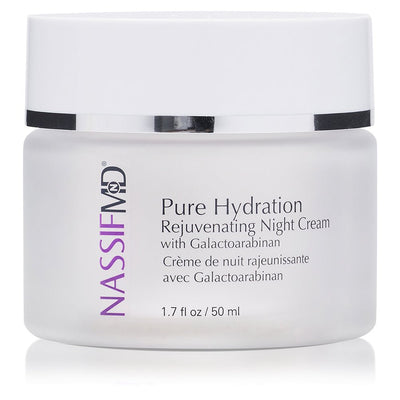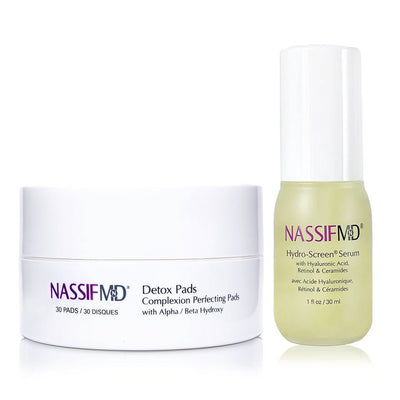Prepare Your Skin for Spring with Antioxidants
Your face and skin are your first contact with the environment. As we move from winter to spring, it means more time outside but also more exposure to UV light, pollution, and free radical damage.
Antioxidants are critical for protecting the skin from sun damage and premature aging. And spring is the perfect time to prioritize antioxidants in your skincare routine in preparation for summer.
Antioxidants are your first line of protection, and sunscreen is your second. Keep reading to learn more about how to spring clean your skincare, including:
- What are antioxidants?
- The benefits of antioxidants for skin
- Hot to use topical antioxidants and daily SPF to improve skin health
- Three must-have NassifMD® antioxidant products for spring
Let’s dive into this important topic!
Spring Clean Your Skincare Routine
In the winter, you likely don’t spend as much time outdoors. Your skin doesn’t see as much sunlight or air pollution.
When thinking about the four pillars of skincare (exfoliate, nourish, hydrate, protect), winter is the season for nourishment and hydration. Your skin may be dryer and require hydrating serums and heavier moisturizers to combat dehydration and deliver extra nutrients to the layers of skin.
As the seasons change, your skincare does too. You’ll naturally move toward lighter products and shift your focus toward skin protection.
Fight Free Radicals with Antioxidants
Free radicles are unstable molecules that damage cell structures. In the skin, free radical damage means loss of barrier function and increased signs of aging, like wrinkles, age spots, and reduced elasticity.
Normal functions of cells produce some free radicals, but skin cells also face free radicals from:
- Sun exposure (UV radiation)
- Cigarette smoke
- Air pollution, such as forest fires, car exhaust, and ozone
- Toxins, including chemicals and pesticides
What Are Antioxidants?
The problem for the skin isn’t necessarily free radicals but when the free radicals outnumber antioxidants. Antioxidants donate electrons to unstable free radicals, making them stable so they can’t damage delicate skin cells.
Without enough antioxidants to protect the skin, the skin loses its defenses and breaks down. Skin cells become more susceptible to damage, translating to more visible signs of aging and increased inflammation.
So as your environmental exposures increase in the spring and summer, you need more antioxidants to protect your skin.
Antioxidants are found in food and topical skincare products. They include vitamins, minerals, and phytonutrients (plant extracts).
Benefits of Antioxidants for Skin
The skin naturally contains high levels of antioxidants stored on a gradient, with the highest amounts in the epidermis, the outermost skin layer. Antioxidants in the skin come from the diet and topical antioxidants delivered via skincare products.
Here are some antioxidants you’ll find in skincare products and their benefits:
- Vitamin C – Vitamin C is found in the skin and is a potent antioxidant to protect and nourish the skin. Collagen production requires vitamin C. Collagen is the main protein in the skin matrix that gives skin plumpness and shape.
Low levels of vitamin C are associated with skin aging, sunburn, hyperpigmentation, scarring, dry skin, inflammation, sagging skin, and poor wound healing. Increasing vitamin C in the skin provides protection contributing to younger-looking skin.
- Vitamin B3 (niacinamide) – Niacinamide is an antioxidant form of niacin required for cellular energy and glutathione production. Glutathione is another critical antioxidant for skin health.
Topically, niacinamide stabilizes the skin barrier, hydrates, and increases ceramide levels, improving the appearance of fine lines and skin tone.
- Vitamin A (retinol) – Retinol is in the retinoid group of vitamin A compounds known for improving skin cell turnover, supporting healthy collagen, and decreasing inflammation. Vitamin A also has antioxidant effects and helps heal sun-damaged skin.
- Vitamin E – Vitamin E is another natural antioxidant in the skin that protects against free radicals, sun damage, and premature aging. Vitamin E also works synergistically with vitamin C.
- Melatonin – Melatonin is well-known as a sleep-promoting hormone but is also one of the body’s most powerful antioxidants. In skin health, melatonin helps prevent free radical damage, protect collagen, and prevents – and even reverse - signs of skin aging.
- Plant Extracts – Various phytochemicals, including polyphenols, demonstrate antioxidant properties when applied topically to the skin. Examples include knotweed extract and Persian silk tree bark (Prodizia).
Antioxidants and SPF – A Powerful Combo
We consider antioxidants your first defense against UV rays, pollution, and other free radicals that damage and age the skin. However, we don’t recommend using only antioxidants when you are out in the sun. UV protection is critical, and it works best when SPF is combined with antioxidants.
The Importance of UV Protection
Ultraviolet radiation (UV radiation), including UVA and UVB, is produced by the sun and interacts with our skin. Chronic sun exposure causes photoaging (sun damage), characterized by epidermal changes, increased pigmentation, uneven skin tone, collagen degradation, and skin cancer. Data suggests up to 80% of facial aging is duet to UV exposure.
Sunscreens help prevent skin cancer, DNA damage, and visible signs of sun damage. Adding SPF (sun protection factor) to your skincare routine is a must, especially in the spring and summer. We recommend at least SPF 30 or higher. Other strategies include seeking shade, and wearing protective coverings like a wide brimmed hat, clothing, and sunglasses.
Your Springtime Antioxidant Skincare Routine
Spring has sprung, and it’s time to give your skin an antioxidant boost! Spring clean your skincare routine to include antioxidant serums in the morning and at night, and an antioxidant sunscreen for daily use.
NassifMD® Daily Revitalizing Antioxidant Serum is a lightweight, oil-free, antioxidant powerhouse of protection. It fights free radicals, evens skin tone, hydrates, and prevents skin damage contributing to younger-looking skin.
The formula contains:
- Vitamin C
- Lipochroman (a powerful vitamin E-like antioxidant)
- Niacinamide
- Ectoin (an antioxidant-like compound)
The magic of this formula is in the synergy of these ingredients to protect and improve the skin.
NassifMD® Nightly Restorative Antioxidant Serum is a similar serum in that it’s lightweight, oil-free, and packed with antioxidants. However, this formula works best when used overnight, allowing the antioxidants to penetrate the layers of skin to rejuvenate, smooth, hydrate, and combat the signs of aging skin.
The serum contains synergistic antioxidants, including:
- Vitamin C
- Vitamin A
- Vitamin E
- Vitamin F (an antioxidant omega-6 fatty acid)
- Melatonin
NassifMD® Defend & Sooth Daily Antioxidant Sunscreen SPF 46 protects against sun damage, UVA and UVB rays, and pollution. The formula contains SPF protection from zinc oxide, in a safe sun-deflecting formula. The SPF combines with powerful antioxidants, including:
- Niacinamide
- Knotweed extract
- Vitamin E
In addition, this formula is lightweight, oil-free, and contains a light tint you can wear alone or under makeup. It also includes hyaluronic acid for hydrating effects.
For maximum results, Dr. Nassif recommends:
In the morning, cleanse your face and use detox pads (add link to detox pads article) if desired. Apply NassifMD® Daily Revitalizing Antioxidant Serum followed by NassifMD® Defend & Sooth Daily Antioxidant Sunscreen SPF 46. Reapply sunscreen before sun exposure or as needed.
In the evening, after cleansing, apply NassifMD® Nightly Restorative Antioxidant Serum to replace antioxidants and nourish the skin overnight.
Spring is your cue to shift away from winter skincare staples and begin saturating the skin with antioxidants to protect it from increased exposure to the sun and toxins in outdoor air. Pair antioxidants with daily sunscreen for the most effective anti-aging benefits. Your future skin will thank you!
References
- Michalak M. (2022). Plant-Derived Antioxidants: Significance in Skin Health and the Ageing Process.International journal of molecular sciences, 23(2), 585.
- Baek, J., & Lee, M. G. (2016). Oxidative stress and antioxidant strategies in dermatology.Redox report : communications in free radical research, 21(4), 164–169.
- Pullar, J. M., Carr, A. C., & Vissers, M. C. M. (2017). The Roles of Vitamin C in Skin Health.Nutrients, 9(8), 866.
- Kirsch, M., & De Groot, H. (2001). NAD(P)H, a directly operating antioxidant?.FASEB journal : official publication of the Federation of American Societies for Experimental Biology, 15(9), 1569–1574.
- Gehring W. (2004). Nicotinic acid/niacinamide and the skin.Journal of cosmetic dermatology, 3(2), 88–93.
- Riahi, R. R., Bush, A. E., & Cohen, P. R. (2016). Topical Retinoids: Therapeutic Mechanisms in the Treatment of Photodamaged Skin.American journal of clinical dermatology, 17(3), 265–276.
- Rattanawiwatpong, P., Wanitphakdeedecha, R., Bumrungpert, A., & Maiprasert, M. (2020). Anti-aging and brightening effects of a topical treatment containing vitamin C, vitamin E, and raspberry leaf cell culture extract: A split-face, randomized controlled trial.Journal of cosmetic dermatology, 19(3), 671–676.
- Bocheva, G., Slominski, R. M., Janjetovic, Z., Kim, T. K., Böhm, M., Steinbrink, K., Reiter, R. J., Kleszczyński, K., & Slominski, A. T. (2022). Protective Role of Melatonin and Its Metabolites in Skin Aging.International journal of molecular sciences, 23(3), 1238.
- Young, A. R., Claveau, J., & Rossi, A. B. (2017). Ultraviolet radiation and the skin: Photobiology and sunscreen photoprotection.Journal of the American Academy of Dermatology, 76(3S1), S100–S109.
- Guan, L. L., Lim, H. W., & Mohammad, T. F. (2021). Sunscreens and Photoaging: A Review of Current Literature.American journal of clinical dermatology, 22(6), 819–828.






















